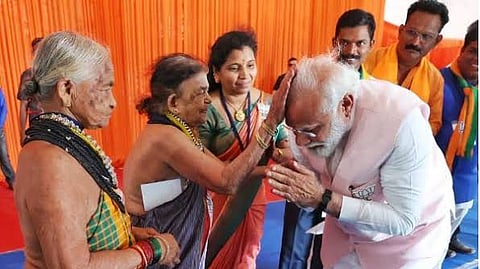

HUBBALLI: Sukri Bommagowda, fondly called Sukrajji, was just 16 years old when she lost her husband. While her community urged her to remarry, she refused, giving the example of a jungle bird that mates for life. Instead, she chose to remain single and dedicate herself to preserving the rich traditions of the Halakki community.
Despite living in poverty, Sukrajji worked tirelessly to safeguard Halakki culture. Thanks to her efforts, many villages in Ankola Taluk still have no liquor outlets, a testament to the social movement she led.
Akshata Krishnamurthy, who authored three books on Sukrajji’s life, recalled, “While documenting Sukrajji, it was an entirely new experience to witness her incredible energy in memorising and singing folk songs. She could sing continuously for more than a day without stopping. I grew up seeing her from my childhood—she used to sing on the radio and at functions. At that time, many women were shy to appear in public and sing, but Sukri Bommagowda broke those stereotypes and stepped forward to create awareness among her community members.”
Dinesh Holla, an environmentalist from Mangaluru, shared his memories of her: “She preached a simple life and shared what she had with her community. Her loss is a national one, and her work cannot be replaced. Without attending any school, she brought a revolution in the lives of the Halakkis.”
Sukrajji not only kept folk traditions alive but also ensured they were passed on to future generations. “She created a team of Halakki girls and women and trained them. They have songs for every occasion—whether working in the fields or fetching green fodder for their cattle, Sukrajji had a song for everything,” Akshata added.
Music ran in Sukrajji’s blood. Her parents, Subbagowda and Devigowda, came from a musical background. Her father performed as a musician during harvest festivals, while her mother sang folk songs.
“This upbringing helped Sukri learn the songs and traditions of her community from childhood. In fact, she was unhappy that the current generation is forgetting Halakki culture. Until the very end, her wish was for it to be preserved,” Akshata said.
The Folk University of Ramnagar, near Bengaluru, was the first to recognise her work, thanks to Govind Mahalaya from Ankola. “Sukrajji could have gained fame on her own, but instead, she built a team of Halakki women who accompanied her in singing unique folk songs that teach respect for nature and humankind,” Akshata said.